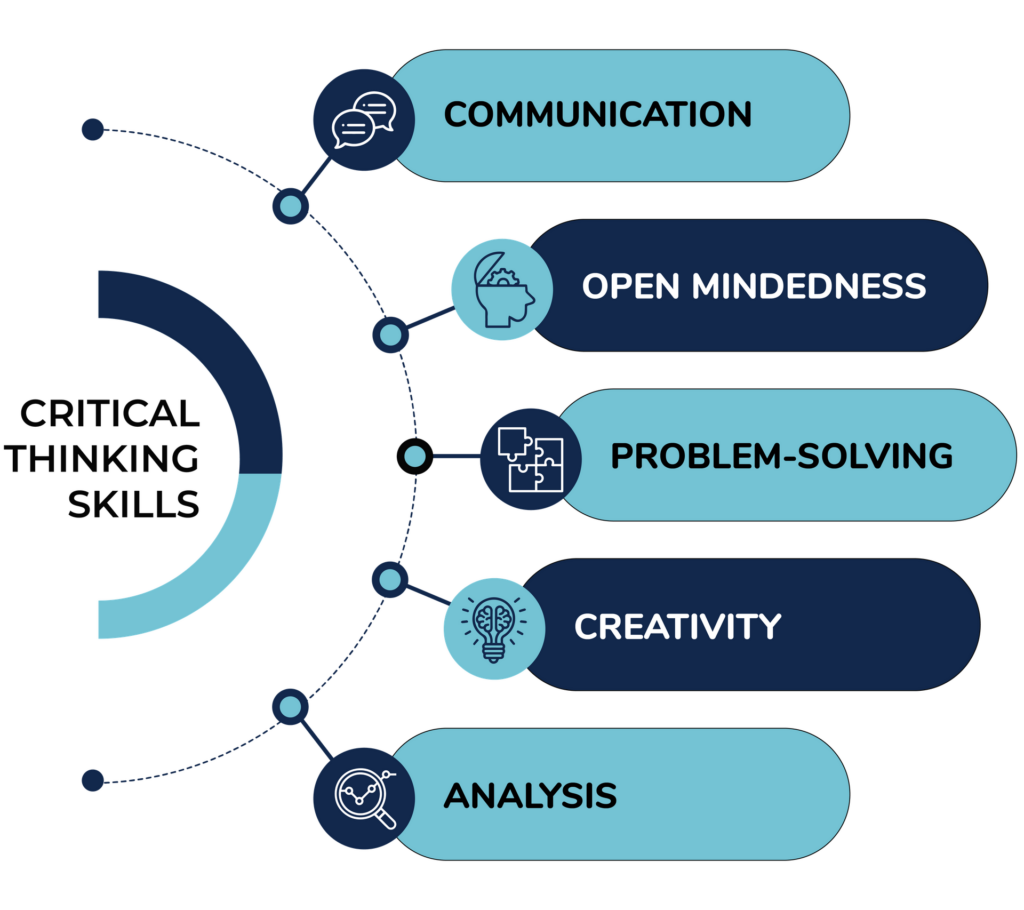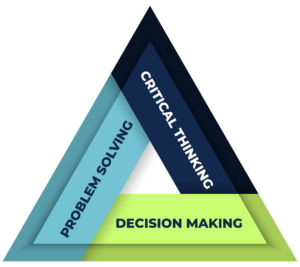Critical Thinking: Problem Solving’s Twin
Critical thinking is the ability to analyse and evaluate information to make informed decisions. Without this skill, problem-solving and decision-making can be challenging. Learn how to develop critical thinking and apply it in the workplace.
Scenario time! You are presented with a task that must be completed within 48 hours. The problem is that you already have a task you are working on that is equally important, and that is halfway done. How do you prioritise the two tasks so everything runs smoothly?

You have been given a chance to apply your critical thinking skills.
Critical thinking is a highly valued skill in the workplace, but it is also an essential tool for success in many aspects of life. It is the ability to objectively analyse and evaluate information to make informed decisions. Professionals with strong critical thinking skills are advantageous in today’s complex and ever-changing business environment. This article will explore the importance of critical thinking for working professionals and how it can be developed.

A 2019 study, ‘Top Missing Skills in the Workplace’ by SHRM, listed ‘problem-solving, critical thinking and creativity’ at the top, with 37% of organisations surveyed saying these are the top missing skills in today’s workforce.(1)
What is Critical Thinking and Why It Matters
The first reason why critical thinking is important for working professionals is that it leads to better decision-making. In today’s fast-paced business environment, making decisions quickly and effectively is essential. Critical thinking enables professionals to analyse information objectively, consider multiple perspectives, and make informed decisions based on sound reasoning.
Critical thinking also improves problem-solving abilities. A crucial aspect of critical thinking is identifying solutions to complex problems. Working professionals with strong problem-solving skills can quickly identify the root cause of a problem and develop creative solutions to solve it. Critical thinking also allows professionals to anticipate and address problems before they become major issues.

Downstream Effects of Critical Thinking at the Workplace
- Critical thinking enhances communication skills. Strong critical thinking skills allow professionals to communicate their ideas and opinions effectively. They can present their viewpoints clearly and logically, supporting their arguments with evidence and facts. This leads to more productive discussions and collaboration among team members, improving overall effectiveness. (2)
- It fosters innovation. Critical thinking involves thinking outside the box and considering alternative solutions. It encourages professionals to challenge assumptions and explore new ideas, leading to innovative solutions and improved business practices. Innovative thinking is essential in today’s fast-changing business environment, and critical thinking is the foundation of this type of thinking.(2)
- Another interesting downstream effect of critical thinking is that it leads to better time management. Critical thinking skills allow professionals to identify and prioritise the most important tasks. They can evaluate the potential outcomes of different options and choose the most effective one. This saves time and leads to more efficient use of resources.(2)
"Critical thinking is thinking about your thinking while you're thinking in order to make your thinking better." – Richard W. Paul
mind-n Pro-Tip:
Sharpening your attention will go a long way in helping you strengthen your critical thinking. Set aside a few minutes daily to practice short focus meditations for a few months, and then self-assess your critical thinking abilities.

Critical thinking has ancient roots, with philosophers like Socrates, Aristotle, and Confucius emphasising the importance of questioning, reasoning, and logical analysis over 2,000 years ago.
How to Develop/Master Critical Thinking
Practice reflection. This involves reflecting on past decisions and analysing what worked well and could have been done differently. It encourages professionals to learn from their mistakes and improve their decision-making skills.
The first tip is to ask questions. This involves questioning assumptions and asking why things are done a certain way. It encourages critical thinking by challenging the status quo and enabling professionals to consider alternative solutions.(3)
Learn continuously. This involves seeking new knowledge and skills and staying current on industry trends and developments. It encourages professionals to think critically and creatively, leading to innovative solutions and improved business practices.(4)
Evaluate the evidence. This involves analysing information objectively and critically and evaluating the quality and reliability of the evidence. It enables professionals to make informed decisions based on sound reasoning and evidence-based research.
Seek diverse perspectives. This involves seeking out the opinions of others and considering alternative viewpoints. It allows professionals to evaluate information objectively and make informed decisions based on various perspectives.
Mindfulness practices have been shown to enhance critical thinking by promoting focus, clarity of thought, and the ability to consider situations without immediate judgment. Engaging in activities like solving crossword puzzles or Sudoku has been linked to maintaining mental sharpness and cognitive function, showcasing the role of critical thinking in such leisure activities.
In Conclusion

Critical thinking is an essential skill that enhances problem-solving by promoting clear, analytical, and rational thought processes. It enables individuals to approach problems systematically and logically, leading to a more effective and sustainable solution.
Think of critical thinking as problem-solving’s twin and the core foundation for effective decision-making. In other words, these three skills coexist with dependencies on one another and are crucial in the modern workplace. Because of these interdependencies, learning and sharpening these skills have cascading effects on developing the other two skills in this skill triumvirate.

Dr. Akshatha Bhat
Akshatha is a cognitive neuroscientist with eight years of academic research experience. Her work has seen her collaborate with leading labs and universities in Europe, including Philips Laboratories in the Netherlands and the University of Magdeburg in Germany. She has authored papers that have been published in several international journals.

You have been given a chance to apply your critical thinking skills.
Critical thinking is a highly valued skill in the workplace, but it is also an essential tool for success in many aspects of life. It is the ability to objectively analyse and evaluate information to make informed decisions. Professionals with strong critical thinking skills are advantageous in today’s complex and ever-changing business environment. This article will explore the importance of critical thinking for working professionals and how it can be developed.

A 2019 study, ‘Top Missing Skills in the Workplace’ by SHRM, listed ‘problem-solving, critical thinking and creativity’ at the top, with 37% of organisations surveyed saying these are the top missing skills in today’s workforce.(1)
What is Critical Thinking and Why It Matters
The first reason why critical thinking is important for working professionals is that it leads to better decision-making. In today’s fast-paced business environment, making decisions quickly and effectively is essential. Critical thinking enables professionals to analyse information objectively, consider multiple perspectives, and make informed decisions based on sound reasoning.
Critical thinking also improves problem-solving abilities. A crucial aspect of critical thinking is identifying solutions to complex problems. Working professionals with strong problem-solving skills can quickly identify the root cause of a problem and develop creative solutions to solve it. Critical thinking also allows professionals to anticipate and address problems before they become major issues.

Downstream Effects of Critical Thinking at the Workplace
- Critical thinking enhances communication skills. Strong critical thinking skills allow professionals to communicate their ideas and opinions effectively. They can present their viewpoints clearly and logically, supporting their arguments with evidence and facts. This leads to more productive discussions and collaboration among team members, improving overall effectiveness. (2)
- It fosters innovation. Critical thinking involves thinking outside the box and considering alternative solutions. It encourages professionals to challenge assumptions and explore new ideas, leading to innovative solutions and improved business practices. Innovative thinking is essential in today’s fast-changing business environment, and critical thinking is the foundation of this type of thinking.(2)
- Another interesting downstream effect of critical thinking is that it leads to better time management. Critical thinking skills allow professionals to identify and prioritise the most important tasks. They can evaluate the potential outcomes of different options and choose the most effective one. This saves time and leads to more efficient use of resources.(2)
"Critical thinking is thinking about your thinking while you're thinking in order to make your thinking better." – Richard W. Paul
mind-n Pro-Tip:
Sharpening your attention will go a long way in helping you strengthen your critical thinking. Set aside a few minutes daily to practice short focus meditations for a few months, and then self-assess your critical thinking abilities.

Critical thinking has ancient roots, with philosophers like Socrates, Aristotle, and Confucius emphasising the importance of questioning, reasoning, and logical analysis over 2,000 years ago.
How to Develop/Master Critical Thinking
Practice reflection. This involves reflecting on past decisions and analysing what worked well and could have been done differently. It encourages professionals to learn from their mistakes and improve their decision-making skills.
The first tip is to ask questions. This involves questioning assumptions and asking why things are done a certain way. It encourages critical thinking by challenging the status quo and enabling professionals to consider alternative solutions.(3)
Learn continuously. This involves seeking new knowledge and skills and staying current on industry trends and developments. It encourages professionals to think critically and creatively, leading to innovative solutions and improved business practices.(4)
Evaluate the evidence. This involves analysing information objectively and critically and evaluating the quality and reliability of the evidence. It enables professionals to make informed decisions based on sound reasoning and evidence-based research.
Seek diverse perspectives. This involves seeking out the opinions of others and considering alternative viewpoints. It allows professionals to evaluate information objectively and make informed decisions based on various perspectives.
Mindfulness practices have been shown to enhance critical thinking by promoting focus, clarity of thought, and the ability to consider situations without immediate judgment. Engaging in activities like solving crossword puzzles or Sudoku has been linked to maintaining mental sharpness and cognitive function, showcasing the role of critical thinking in such leisure activities.
In Conclusion

Critical thinking is an essential skill that enhances problem-solving by promoting clear, analytical, and rational thought processes. It enables individuals to approach problems systematically and logically, leading to a more effective and sustainable solution.
Think of critical thinking as problem-solving’s twin and the core foundation for effective decision-making. In other words, these three skills coexist with dependencies on one another and are crucial in the modern workplace. Because of these interdependencies, learning and sharpening these skills have cascading effects on developing the other two skills in this skill triumvirate.

Dr. Akshatha Bhat
Akshatha is a cognitive neuroscientist with eight years of academic research experience. Her work has seen her collaborate with leading labs and universities in Europe, including Philips Laboratories in the Netherlands and the University of Magdeburg in Germany. She has authored papers that have been published in several international journals.



